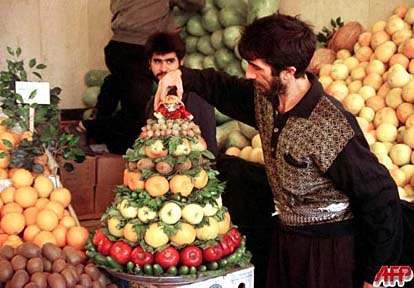
Photo by Atta Kenare, AFP
Iranians celebrate Zoroastrian feast during Moslem
holy month
TEHRAN, Dec 21 (AFP) - Iranians celebrated Monday night the feast of
Yalda, a religious tradition older than Islam, even though this year it
fell during the Moslem fasting month of Ramadan.
While Ramadan is marked by abstinence from eating, drinking and smoking,
Yalda, which celebrates the longest night in the year, is an occasion for
gorging oneself on various snacks and fruits.
Yalda dates back several thousand years to when Zoroastrianism, a dualist
faith concerned with the battle between good and evil, was the official
religion of ancient Persia.
It is characterized by family reunions and feasting with grandparents
and friends, the telling of stories and the reading of poetry to the younger
generations.
It is also virtually obligatory to eat summer fruits like water melon
and local sweet melons, along with dried fruits and nuts, in the belief
that they will keep illness at bay until the spring.
Yalda also marks the end of autumn and start of winter, which ancient
Persians saw as a time when nature sinks into slumber until the spring
equinox in March.
The tradition, like many other Zoroastrian customs, has survived all
political upheavals in former Persia, notably the arrival of Islam in the
seventh century.
In a sign of how dear Iranians hold their ancient tradition, the restrictions
imposed on food consumption by Ramadan did little to ease the zest for
celebrating Yalda.
"Iranians gather tonight to celebrate Yalda, this national custom
and also to observe Ramadan, our other religious custom," said the
evening daily Etelaat on Monday.
As in previous years, shops displayed new stocks of nuts and dried fruit
amid a frenzy of activity in the streets.
Large quantities of melons were retrieved from industrial refrigerators,
where they had been preserved for the feast, and offered on the market.
Yalda is believed by some to be marked by evil spirits and families
get together to escape solitude and dispel bad omens.
Ancient Zoroastrians, for whom day and night symbolize good and evil,
saw Yalda as a time when the battle between the two forces reached its
peak.
The end of the night and the dawn represents the final victory of the
good, embodied in the Zoroastrian god Ahur Mazda, over the devil Ahriman.
Around 50,000 of Iran's 60 million population are Zoroastrians.
They believe their prophet Zarathustra was born at Takht-e-Soleyman,
in Iranian Azerbaijan, in 1737 BC, and was buried at Mazar-i-Sharif in
northern Afghanistan.
The sect was predominant in almost all of ancient Persia before the
Islamic conquest in the seventh century.
Iran's Islamic authorities recognize the Zoroastrian religion and the
community has the right of worship and religious education. It also has
its own MP in parliament.
Forwarded by Payman Arabshahi


![]()